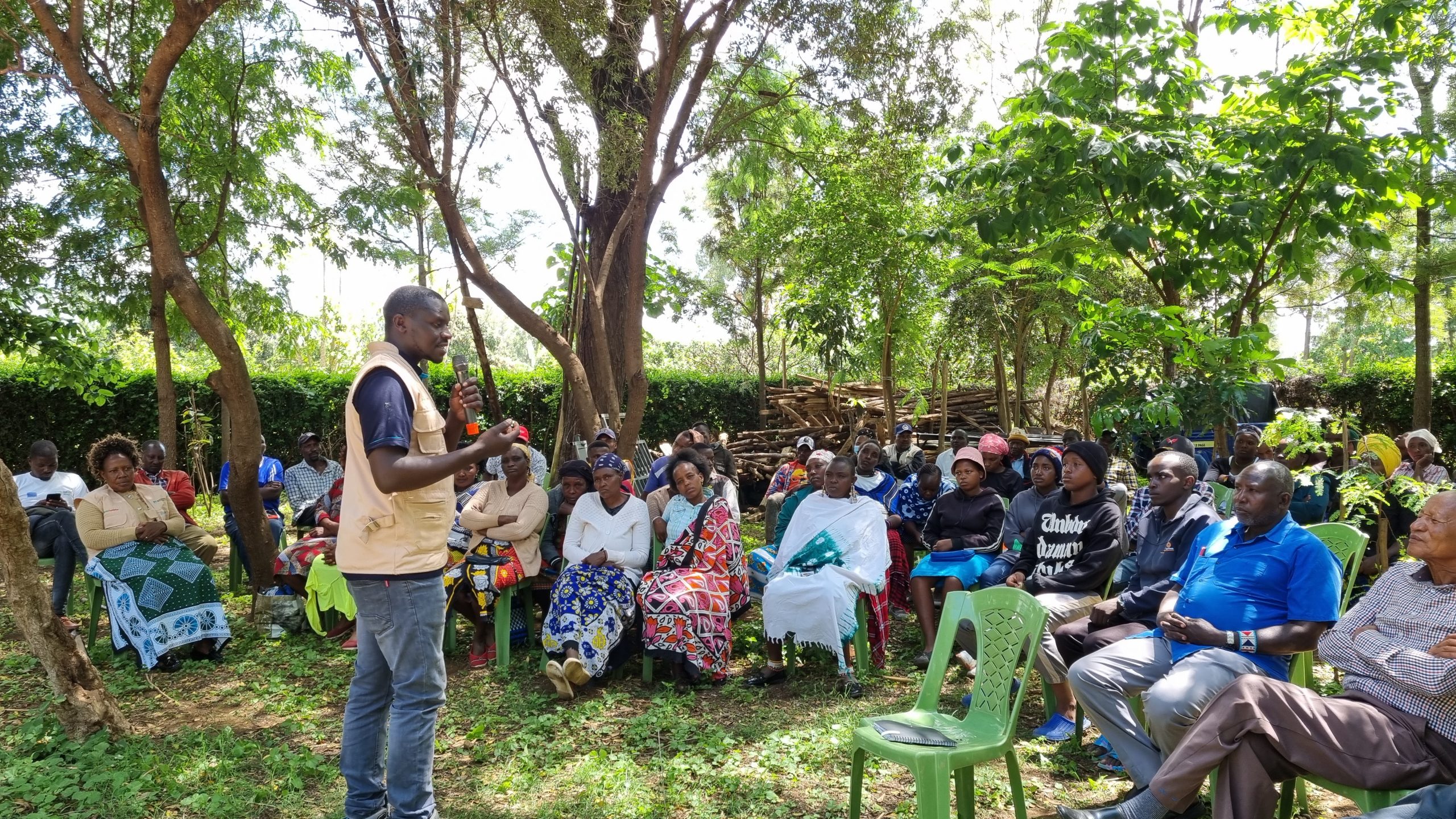
7 th December 2023-Kimana is witnessing the dawn of a transformative era in its agricultural sector as the much-anticipated Wezesha training initiative officially kicks off. The enthusiastic turnout of farmers is a testament to the community’s overwhelming readiness to seize this learning opportunity.
This training, set to span over the next five months, is expected to take the farmers on a transformative journey. The curriculum is designed to offer in-depth training on Good
Agricultural Practices (GAP), green energy, home economics, and advocacy. These are vital areas that have the potential to redefine the agricultural landscape of Kimana and significantly
improve the livelihoods of its inhabitants.
In her opening remarks, Jennifer Githinji, the Director of AIS, welcomed the farmers with an inspiring message. She said”, This marks not just a new chapter in your individual lives but a
significant leap for our collective agricultural prosperity. By embracing these training sessions, you are shaping the future of Kimana’s farming community.” Her words echoed the high spirit of
optimism permeating the event and underscored the transformative potential of the Wezesha training.
Details of the Wezesha training
The Wezesha training is more than just a farming initiative; it’s an all-encompassing program designed to equip farmers with essential skills and knowledge to improve their livelihoods and
contribute positively to the community. The training focuses on four main areas:
1. Good Agricultural Practices (GAP)
In the Wezesha training program in Kimana, farmers will be taught about Good Agricultural Practices (GAP) through a series of interactive and practical sessions. The training will cover
various aspects of sustainable and safe food production, including soil and water management, integrated pest management, post-harvest handling, and worker health and safety.
Farmers will learn about the importance of implementing GAP to enhance the quality and safety of their produce, reduce environmental impact, and improve market access. The training will also
include demonstrations, field visits, and hands-on activities to ensure farmers can apply the knowledge and skills gained in their agricultural practices. The Wezesha training aims to
promote sustainable and responsible farming practices in Kimana by equipping farmers with the necessary knowledge and tools.
2. Green Energy
The Wezesha training program in Kimana will focus on promoting the adoption and utilization of solar power as a sustainable energy solution for agricultural operations. Farmers will learn
about the benefits and methods of integrating solar panels to power irrigation systems for lighting their homes and about the newest solar inventions, including solar-powered barber kits,
sewing machines, solar-powered public address systems, and incubators. The training will emphasize the cost savings, reliability, and environmental advantages of
harnessing solar energy. Additionally, farmers will be provided with guidance on the efficient use of solar power systems, empowering them to transition smoothly to this renewable energy
source. By incorporating solar power into their agricultural practices, farmers in Kimana will reduce their carbon footprint and improve their farming operations for long-term sustainability and
resilience.
3. Home Economics
Farmers will receive instruction on home economics, including establishing and maintaining kitchen gardens. They will learn about the importance of kitchen gardens in providing fresh,
nutritious produce for their households and communities. The training will cover topics such as selecting suitable locations for kitchen gardens, different types of kitchen gardens, soil
preparation, planting, watering, and pest management. Additionally, farmers will learn about cultivating a variety of vegetables and herbs, as well as
sustainable gardening practices. Farmers will gain valuable knowledge and skills to enhance food security, improve nutrition, and promote sustainable household living by incorporating
home economics into the training.
Advocacy
Advocacy is integral to the Wezesha training, designed to empower Kimana’s farmers to assert their rights and influence policy in the agricultural sector. This training will provide a deep
understanding of their rights and existing agricultural policies and equip them with the tools to lobby for beneficial changes.
The farmers will learn practical strategies for engaging with decision-makers, navigating bureaucratic procedures, and fostering collective action. By standing together and using their
newly acquired knowledge, they can advocate for their rights more effectively and bring about tangible change in their community. As Director Jennifer Githinji aptly put it, knowledge is
power. And when used correctly, it can transform lives and society.”
Benefits of the Wezesha training for Kenyan farmers
The benefits of the Wezesha training are vast and varied. Farmers can expect to increase their yield and income by adopting GAP. Green energy sessions will enlighten them on
environmentally friendly farming practices that help preserve the earth for future generations.
Home economics training will aid in better resource management, translating to improved living standards. Additionally, advocacy skills will enable farmers to push for policies favouring their
work and the agricultural sector. Farmers eagerly look forward to the coming months, hoping to reap substantial benefits from the training. Some have shared personal stories of their struggles in farming and how they believe this training will be a game-changer.
The Impact of Wezesha training on the community
The Wezesha training doesn’t just benefit individual farmers; it has a far-reaching impact on the entire community. The environment will significantly benefit by adopting sustainable farming
practices and green energy, leading to a healthier community. Moreover, the training’s focus on home economics and advocacy can influence social change, as
empowered farmers can create ripple effects in the society around them. Through this initiative, we can expect to see better farming practices, increased productivity, improved living standards,
and a more sustainable Kimana.
Looking ahead
As we look ahead to the coming months of the Wezesha training, farmers can expect an enriching and transformative journey. The comprehensive curriculum promises a holistic
approach to improving farming techniques, household management, and advocacy skills. As we embark on this journey, let’s remember that the success of this training lies in our hands.
Let’s embrace this opportunity with open minds and hearts, ready to learn and transform our farming practices for the betterment of our lives and our community. Here's to a prosperous farming future in Kimana!
